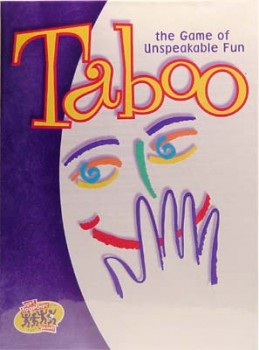“You keep using that word . . . I do not think it means what you think it means.” –Inigo Montoya, The Princess Bride
Have you ever played “Taboo?” It’s a fun game by Hasbro that forces participants to describe something without using many of the words that people might commonly use to describe it. You might have to explain “pinball” for example, without using arcade, game, tilt, flippers, roll or, of course, pinball.
Not only is the game fun, it challenges players to think differently about how they communicate. Because certain words are “taboo” they can’t fall back on familiar patterns. They are forced to use language in a new way.
Eliezer Yudkowsky, who writes about human rationality on the “Less Wrong” blog, suggests that making certain words taboo is a way to bring clarity to a debate where people might be using the same word, but coming from different perspectives.
For example, the old thought experiment, “if a tree falls in a forest, and no one is around to hear it, does it make a sound?” gets people debating different perspectives that are generally about how one defines the word “sound.” Does “sound” describe the vibrations creating by the tree falling? Or does “sound” describe the experience of those vibrations in the ear of a living being?
Here’s Yudkowsky describing the debate between two fictional characters named Albert and Barry:
Since one says “sound” and one says “~sound”, we must have a contradiction, right? But suppose that they both dereference their pointers before speaking:
Albert: “A tree falling in a deserted forest matches [membership test: this event generates acoustic vibrations].”
Barry: “A tree falling in a deserted forest does not match [membership test: this event generates auditory experiences].”
Now there is no longer an apparent collision – all they had to do was prohibit themselves from using the word sound. If “acoustic vibrations” came into dispute, we would just play Taboo again and say “pressure waves in a material medium”; if necessary we would play Taboo again on the word “wave” and replace it with the wave equation. (Play Taboo on “auditory experience” and you get “That form of sensory processing, within the human brain, which takes as input a linear time series of frequency mixes.”
Excerpt from: LessWrong. “A Human’s Guide to Words” from http://lesswrong.com/lw/nu/taboo_your_words/.

![]() Daniela Vladimirova via Compfight
Daniela Vladimirova via Compfight
I think this “Taboo” approach could also help with many of the debates we have around happiness. Happiness, I’ve been somewhat surprised to find, is a controversial subject. Is the pursuit of happiness a worthwhile goal? Should governments be measuring and ensuring the happiness of their citizens? Does money make us happy? Is happiness good for our health? Do children contribute to (or take away from) our happiness? These are all questions I have heard debated ad infinitum since I began studying positive psychology.
The typical happiness debate goes like this:
Albert: “Happiness is a universal goal that we all have and is the ultimate purpose for living.”
Barry: “Happiness is a shallow hedonic pursuit that distracts us from more meaningful objectives.”
How can we reconcile two such diametrically opposed viewpoints?
We could ask Albert and Barry to describe their position without using the word “happiness.” While we are at it, let’s make other commonly used words taboo, such as joy, emotions, fulfillment, satisfaction, contentment, or flourishing.
Now Albert and Barry are forced to define their positions more clearly:
Albert: “{The ultimate realization of all of our preferences for the life we live and the person we become} is a universal goal that we all have and is the purpose for living.”
Barry: “{Subjectively hedonic experience} is a shallow pursuit that distracts us from more meaningful objectives.”
Once again, the apparent conflict disappears (or is greatly diminished) when we take a step back from our familiar language patterns.
In a previous article, I said that “the first rule of happiness” is “you do not talk about happiness.” It just muddles the issue when communication is built around a word that has so many different meanings and nuances. But now when I find myself being drawn into a happiness debate, I just suggest a game of Happiness Taboo.



Hello Jeremy ~ The subjectivity of the word happiness and the reference point we measure it against as individuals seems to make defining it broadly so difficult.
So a ‘game’ that encourages each person to find their own definition is interesting, so long as they feel really free to do that.
Some people lose touch with ‘happiness’ as a result of a traumatic experience, and whether or not they fully recover their earlier sense of it depends on so many factors.
Thinking about all this, I came across an interesting conference ‘New Scholarship on Happiness’ held at Duke University earlier this year.
Many of the sessions are on YouTube on the Duke Law channel, which you might find interesting: http://youtu.be/SJr4xl-kt1w
Awesome! It looks like I will be teaching a college course on well-being this fall, and I think I might make this one of my opening exercises… Don’t mention the H-word! LOL
Very cool concept, J! I wish some profs, researchers and theoreticians took you up on it – would love to see that in action! 😉
MJ